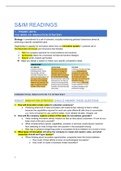Summary
Summary Strategy & Innovation Management (EBM066A05)
- Course
- Institution
Pisano, G. (2015) You Need an Innovation Strategy. Harvard Business Review, 46 (June): 44-54. Zollo, M., Minoja, M., & Coda, V. (2018) Toward an Integrated Theory of Strategy. Strategic Management Journal, 39(6): . Gong, Y., Kim, T-Y., Lee, D-R., and Zhu, J. (2013) A Multilevel Model of Team...
[Show more]



